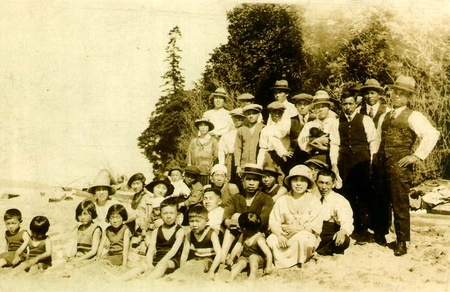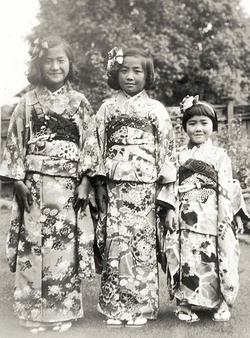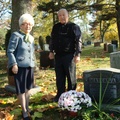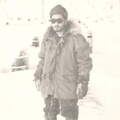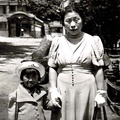Read Part 3 >>
Back to the store…
Upstairs at the rear was a huge kitchen area with a row of about three very long dining tables where everybody sat and ate their meals. There was always a cook on duty. On the other side were sofas, chairs, tables, phonograph (that’s a 78 rpm record player and there were some that had to be cranked manually), and a large radio with short wave so that they can listen to broadcasts from Japan for relaxation.
My mother was into music too and she played violin and was a great singer. My father didn’t have much of a voice but at least he was trying to sing. I still remember some Japanese songs too and can still play some on the harmonica which I picked up myself by watching others play.
There was a large door leading upstairs to hotel rooms where some of the bachelors and sales-truck drivers lived. It was modified that way and I guess the store had a contract with the hotel next door for the use (I don’t know the name of the hotel). My uncle Hane Oue was living up there too and we used to visit him. As a child, I enjoyed and remembered a few New Year’s Days as best when everybody gathered for the nice typical Japanese feast that the cook prepared for us—yummy! Some years we celebrated at Fuji Chop Suey restaurant across the street owned by another Maikawa brother, Sannosuke-san who owned the Maikawa Fish store a few doors away. Maybe he owned the hotel next door too as he was into a lot of things I heard?
We were living out in the suburbs near Hastings Park and I used to sometimes walk over to the store to see Dad but the first thing I usually did was run upstairs to see the cook. I can’t remember her name as I always called her Oba-chan and she always gave me a big hug, then held my hand and led me down to the candies counter and filled a small bag with goodies for me, paid for it, and led me back up to the kitchen to talk or play. When the bag was empty I remember once or twice I went back downstairs for a refill and snuck it out although I knew the sales lady was watching. I must have been a spoiled brat when I think about it now!
Talking about sinning, I used to enjoy going to the United Church Christmas concert and party as there were nice goodies served there too. History goes way back for the Japanese immigrants in the early 1920s belonging to the Methodist Church before becoming the United Church of Canada. My two sisters above me, Mary and Sumi attended church regularly but I think I was too young to go (good excuse, huh?).
The party foods were manju and stuff but I can’t forget the Japanese mikan and the pomegranates as they were really tasty. When I used to lie down on the floor after I ate, Mom (still thinking as a Buddhist) used to tell me that after I die, I will come back as a pig in my second life so I guess she was right—probably it’s my third life now as a pig. The best thing in life for me was food since I was a kid.
Importing Goods from Japan
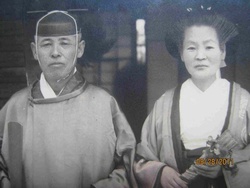
Tomekichi Maikawa & wife Kiri Natsuhara, older sister of my mom's mother. Early 1930s photo in Japan dressed in historic costume.
Japanese goods from Japan—I don’t know what companies they were dealing with but I would suspect they dealt with many as there were many varieties of goods ordered. Later, I heard that my mom’s mother’s sister Kiri Natsuhara, wife of Tomekichi-san was mainly involved with dealing with some of the wholesalers in Japan.
I guess Tomekichi-san had the knack of being surrounded by many people working for him! Probably it was the traditional cultural side which helped his dominance over people.
It wasn’t like the modern days that goods were sent via aircraft, but it was by steam ships and that took around 10 days? Then the products were unloaded and delivered to the store. They probably had to think ahead by seasons and order in bulk. Communications were probably done by telegraphs via short wave transmission or through letters via the slow boat—such a difference now, eh?
There were a variety of items imported mainly for the Japanese communities—yukatas, kimonos for special occasions, Japanese dishes and utensils, Japanese basic food stuff and canned goods, zoris (just to name a few things they mainly used on a daily basis), artwork, special dolls and special gifts they gave to kids for celebration days for girls and boys, all sorts of toys, books, magazines, games, etc.
Just to mention one food item that had to be imported because no other nationalities ate such things, were dried fish from sizes 1 inch to 5 inches. It was cooked in many ways and even eaten as is for snacks. We sure must have had fishy bad breaths! But it was good and much healthier than potato chips we eat today!
© 2013 Frank Maikawa


